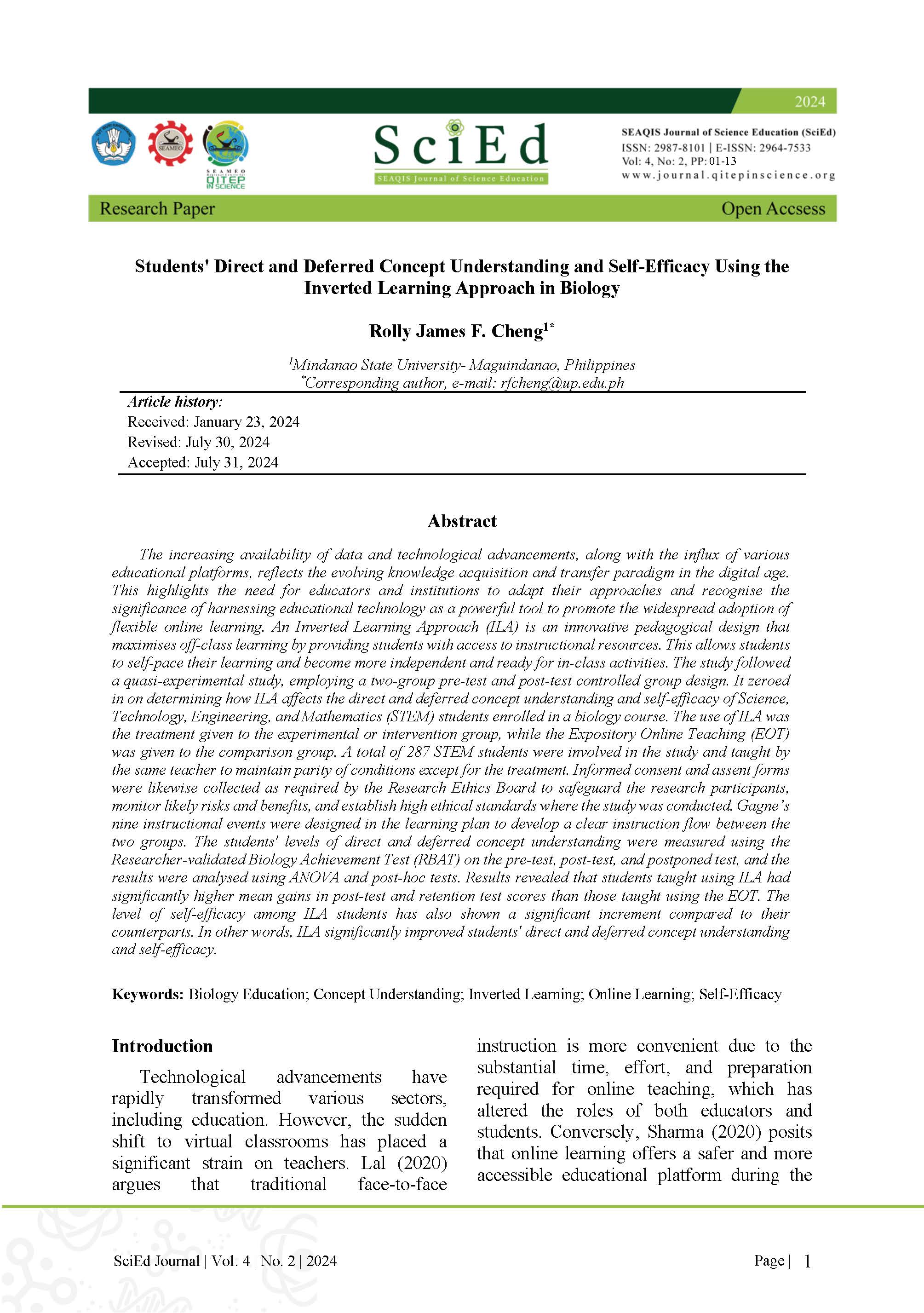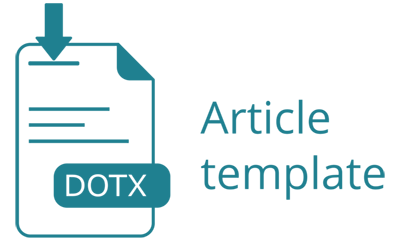Students' Direct and Deferred Concept Understanding and Self-Efficacy Using the Inverted Learning Approach in Biology
DOI:
https://doi.org/10.58249/sjse.v4i02.128Keywords:
Biology Education, Concept Understanding, Inverted Learning, Online Learning, Self-EfficacyAbstract
The increasing availability of data and technological advancements, along with the influx of various educational platforms, reflects the evolving knowledge acquisition and transfer paradigm in the digital age. This highlights the need for educators and institutions to adapt their approaches and recognise the significance of harnessing educational technology as a powerful tool to promote the widespread adoption of flexible online learning. An Inverted Learning Approach (ILA) is an innovative pedagogical design that maximises off-class learning by providing students with access to instructional resources. This allows students to self-pace their learning and become more independent and ready for in-class activities. The study followed a quasi-experimental study, employing a two-group pre-test and post-test controlled group design. It zeroed in on determining how ILA affects the direct and deferred concept understanding and self-efficacy of Science, Technology, Engineering, and Mathematics (STEM) students enrolled in a biology course. The use of ILA was the treatment given to the experimental or intervention group, while the Expository Online Teaching (EOT) was given to the comparison group. A total of 287 STEM students were involved in the study and taught by the same teacher to maintain parity of conditions except for the treatment. Informed consent and assent forms were likewise collected as required by the Research Ethics Board to safeguard the research participants, monitor likely risks and benefits, and establish high ethical standards where the study was conducted. Gagne’s nine instructional events were designed in the learning plan to develop a clear instruction flow between the two groups. The students' levels of direct and deferred concept understanding were measured using the Researcher-validated Biology Achievement Test (RBAT) on the pre-test, post-test, and postponed test, and the results were analysed using ANOVA and post-hoc tests. Results revealed that students taught using ILA had significantly higher mean gains in post-test and retention test scores than those taught using the EOT. The level of self-efficacy among ILA students has also shown a significant increment compared to their counterparts. In other words, ILA significantly improved students' direct and deferred concept understanding and self-efficacy.
References
Acedo, E., & Robles, A. C. M. O. (2019). Development and Validation of Educational Video Tutorials for 21st Century Secondary Learners. Asian Journal of Multidisciplinary Studies, 2(2), 42-49.
Adiansyah, R., Corebima, A.D., Zubaidah, S., Rohman, F. (2021). The correlation between metacognitive skills and scientific attitudes towards the retention of male and female students in South Sulawesi, Indonesia. International Journal of Evaluation and Research in Education (IJERE). DO - 10.11591/ijere.v10i4.21597.
Ahmad, D., & Arifin, M.A. (2021). Exploring student achievement and perceptions in an online flipped grammar course. Indonesian Journal of Applied Linguistics. https://doi.org/10.17509/ijal.v10i3.31750
Algarni, B. M. (2023). Active Learning Strategies in the Flipped Classroom Approach. In Handbook of Research on Facilitating Collaborative Learning Through Digital Content and Learning Technologies (pp. 384-399). IGI Global. DOI: 10.4018/978-1-6684-5709-2.ch019
Al-Balushi, K. A., & Al-Balushi, S. M. (2018). Effectiveness of Brain-Based Learning for Grade Eight Students' Direct and Postponed Retention in Science. International Journal of Instruction, 11(3), 525-538.
Anderson, L. W. & Krathwohl, D. R. (2001). A Taxonomy for Learning, Teaching, and Assessing, a Revision of Bloom’s Taxonomy of Educational Objectives. New York: Addison Wesley Longman, Inc.
Arante, R. B., & Castro, C. M. C. (2022). LEARNER’S PERSPECTIVE ON THE IMPLEMENTATION OF ONLINE LEARNING IN ONE UNIVERSITY OF SOUTHERN PHILIPPINES.
Azmin, N. F., Abd Wahab, M. S., Ahmad, F., Asnawi, A. L., Jusoh, A. Z., Ibrahim, S. N., & Jimat, D. N. (2021). Engineering Students’ Perceptions and Acceptance of the Online Flipped Classroom for Learning during the COVID-19 Pandemic. IIUM Journal of Educational Studies. https://doi.org/10.31436/ijes.v9i3.407
Barral, A. M., Ardi-Pastores, V. C., & Simmons, R. E. (2018). Student Learning in an Accelerated Introductory Biology Course Is Significantly Enhanced by a Flipped-Learning Environment. CBE—Life Sciences Education, Vol. 17. No. 3. https://doi.org/10.1187/cbe.17-07-0129
Burkhart, S. J., Taylor, J. A., Kynn, M., Craven, D. L., & Swanepoel, L. C. (2020). Undergraduate Students Experience of Nutrition Education Using the Flipped Classroom Approach: A Descriptive Cohort Study. Journal of nutrition education and behavior, 52(4), 394-400. https://doi.org/10.1016/j.jneb.2019.06.002
Bond, M. (2020). Facilitating student engagement through the flipped learning approach in K-12: A systematic review. Computers & Education, 151, 103819. https://doi.org/10.1016/j.compedu.2020.103819
Chang, S. C., & Hwang, G. J. (2018). Impacts of an augmented reality-based flipped learning guiding approach on students’ scientific project performance and perceptions. Computers & Education, 125, 226-239. https://doi.org/10.1016/j.compedu.2018.06.007
Cheng, R. J. F. (2023) The Students’ Performance of Notre Dame of Cotabato in the Notre Dame Educational Association - Science Achievement Test: Basis for Improvement Plan. International Journal of Open-Access, Interdisciplinary & New Educational Discoveries of ETCOR Educational Research Center (iJOINED ETCOR).
Cheng, R. J. F., & Bagarinao, R. T. (2023). A Reflexive Thematic Analysis of the Lived Experiences of STEM Students on the Use of Online Inverted Learning Approach in Biology. Asian Journal of Education and Human Development (AJEHD), 4(1).
Christiansen, M. A., Nadelson, L., Etchberger, L., Cuch, M., Kingsford, T. A., & Woodward, L. O. (2017). Flipped learning in synchronously-delivered, geographically-dispersed general chemistry classrooms. Journal of Chemical Education, 94(5), 662-667. https://doi.org/10.1021/acs.jchemed.6b00763
Chickering, A. W., & Gamson, Z. F. (1987). Seven principles for good practice in undergraduate education. AAHE Bulletin, 3, 7. https://eric.ed.gov/?id=ed282491
Code, J., Zap, N., & Ralph, R. (2021). Academic success online: The mediating role of self-efficacy on personality and academic performance. International Journal on E-Learning. https://www.learntechlib.org/p/212813/
Deci, E. L., & Ryan, R. M. (2002). Self-determination research: Reflections and future directions. In E. L. Deci & R. M. Ryan (Eds.), Handbook of self-determination research (pp. 431–441). University of Rochester Press.
Drozdikova-Zaripova, A. R., & Sabirova, E. G. (2020). Usage of Digital Educational Resources in Teaching Students with Application of “Flipped Classroom” Technology. Contemporary Educational Technology. https://doi.org/10.30935/cedtech/8582
Evseeva, A., & Solozhenko, A. (2015). Use of flipped classroom technology in language learning. Procedia-Social and Behavioral Sciences, 206, 205-209. https://doi.org/10.1016/j.sbspro.2015.10.006
Goff, E. E., Reindl, K. M., Johnson, C., McClean, P., Offerdahl, E. G., Schroeder, N. L., & White, A. R. (2018). Investigation of a Stand-Alone Online Learning Module for Cellular Respiration Instruction †. Journal of Microbiology & Biology Education, 19. https://doi.org/10.1128/jmbe.v19i2.1460
Grabau, C. R. (2015). Undergraduate student motivation and academic performance in a flipped classroom learning environment (Doctoral dissertation). Unpublished Ph. D. dissertation, Saint Louis University, USA.
Haniah, A. R. Aman, & Setiawan, R. (2020). Integration of strengthening of character education and higher order thinking skills in history learning. Journal of Education and Learning (EduLearn), vol. 14, no. 2, pp. 183–190, doi: 10.11591/edulearn.v14i2.15010.
Harsch, D. M. (2008). The role of self-efficacy, locus of control, and self-handicapping in dissertation completion (Doctoral dissertation, University of Akron). https://search.proquest.com/openview/f1d460993fe33e80e84963ef7f37506e/1?pq-origsite=gscholar&cbl=18750
Heaperman, S., & Sudweeks, F. (2001). Achieving self-efficacy in the virtual learning environment.
Hew, K. F., Jia, C., Gonda, D. E., & Bai, S. (2020). Transitioning to the “new normal” of learning in unpredictable times: pedagogical practices and learning performance in fully online flipped classrooms. International Journal of Educational Technology in Higher Education, 17. https://doi.org/10.1186/s41239-020-00234-x
Karpicke, J. D., & Roediger III, H. L. (2007). Repeated retrieval during learning is the key to long-term retention. Journal of Memory and Language, 57(2), 151-162. https://doi.org/10.1016/j.jml.2006.09.004
Lal, A. (2020). From noisy classrooms to virtual teaching, teachers brave 'new normal' [patna]. The Times of India. https://www.proquest.com/newspapers/noisy-classrooms-virtual-teaching-teachers-brave/docview/2440306609/se-2?accountid=207160
Lee, M. K., & Park, B. K. (2018). Effects of flipped learning using online materials in a surgical nursing practicum: A pilot stratified group-randomized trial. Healthcare informatics research, 24(1), 69. https://doi.org/10.4258/hir.2018.24.1.69
Martin, F., Tutty, J.I., & Su, Y. (2010). Influence of Learning Management Systems Self-Efficacy on E-Learning Performance. Journal on School Educational Technology, 5, 26-35.
Morris, L., & McDermott, L. (2022). Improving information literacy and academic skills tuition through flipped online delivery. Journal of Information Literacy, 16(1).
Nair, P. (2020). Unlocking Opportunities [Times Nation]: As Technology-Enabled Education Gains Ground And Blended Learning Becomes The New Normal, The Education Sector In The Country Is On A Paradigm Shift, Redefining The Role Of Educators And Opening Up New Career Opportunities. The Times of India (Online). https://www.proquest.com/newspapers/unlocking-opportunities-times-nation/docview/2420906542/se-2?accountid=207160
Nurisya, K., Corebima, A. D., & Rohman, F. (2016). Hubungan keterampilan metakognitif dengan retensi siswa pada pembelajaran biologi berbasis problem based learning (PBL) Di SMA Kota Malang. Seminar Pendidikan dan Saintek, pp. 910–914.
Offerman-Celentano, A. (2017). Flipped classrooms: How secondary instructors and administrators define and implement flipped instruction. St. John's University (New York), School of Education and Human Services.
Paul, A., Leung, D., Salas, R. M. E., Cruz, T. E., Abras, C., Saylor, D., ... & Strowd, R. E. (2023). Comparative effectiveness study of flipped classroom versus online-only instruction of clinical reasoning for medical students. Medical education online, 28(1), 2142358.
Pintrich, P. (2004). A conceptual framework for assessing motivation and self-regulated learning in college students. Educational Psychology Review, 16(4), 385-407. https://doi.org/10.1007/s10648-004-0006-x
Purwanti, I. T., & Suryawati, E. (2022). Video Lectures in Online EFL Flipped-Classroom: Effectiveness, Students' Evaluation and Experiences. European Journal of Educational Research, 11(2), 885-898.
Riskiningtyas, L., & Wangid, M. N. (2019). Students’ self-efficacy of mathematics through brain based learning. Journal of Physics: Conference Series (Vol. 1157, No. 4, p. 042067). IOP Publishing. https://doi.org/10.1088/1742-6596/1157/4/042067
Rossi, R. D. (2015). ConfChem conference on flipped classroom: improving student engagement in organic chemistry using the inverted classroom model. Journal of Chemical Education, 92(9), 1577-1579. https://doi.org/10.1021/ed500899e
Ryan, R. M., & Deci, E. L. (2000). Intrinsic and extrinsic motivations: Classic definitions and new directions. Contemporary educational psychology, 25(1), 54-67.
Schunk, D. H., & Miller, S. D. (2002). Self-efficacy and adolescents’ motivation. Academic motivation of adolescents, 2, 29-52.
Sharma, N. (2020). Educating Online though Unlocking Posiotivity. The Times of India (Online) . https://www.proquest.com/newspapers/educating-though-online-unlock-positoivity/docview/2424568894/se-2?accountid=207160
Shen, D., Cho, M. H., Tsai, C. L., & Marra, R. (2013). Unpacking online learning experiences: Online learning self-efficacy and learning satisfaction. The Internet and Higher Education, 19, 10-17. https://doi.org/10.1016/j.iheduc.2013.04.001
Shim, E., & Inti, S. (2022). Effectiveness of the Synchronous Online Flipped Classroom on Students’ Learning During the COVID-19 Pandemic. EPiC Series in Built Environment, 3, 670-678.
Sholihah, T. M., & Lastariwati, B. (2020). Problem based learning to increase competence of critical thinking and problem solving. Journal of Education and Learning (EduLearn), 14(1), 148-154. https://doi.org/10.11591/edulearn.v14i1.13772
Silva, T., & Galembeck, E. (2014). Menggunakan 3DClass Untuk Membalik Kelas Biokimia. Revista De Ensino De Bioquímica , 12 (1), 88. https://doi.org/10.16923/reb.v12i1.353
Sletten, S. R. (2015). Investigating flipped learning: Post-secondary student selfregulated learning, perceptions, and achievement. The University of North Dakota.
Strohmyer, D. A. (2016). Student perceptions of flipped learning in a high school math classroom (Doctoral dissertation, Walden University).
Talar, Y., & Gozaly, J. (2020). Student Retention in Indonesian Private University. International Journal of Evaluation and Research in Education, 9(3), 486-493.
Tapilouw, F., & Setiawan, W. (2008). Meningkatkan pemahaman dan retensi siswa melalui pembelajaran berbasis teknologi multimedia interaktif. Jurnal pendidikan teknologi informasi dan komunikasi, 1(2), 19-25.
Tsai, C. L., Cho, M. H., Marra, R., & Shen, D. (2020). The Self-Efficacy Questionnaire for Online Learning (SeQoL). Distance Education, 41(4), 472-489. https://doi.org/10.1080/01587919.2020.1821604
Tsai, C. W., Shen, P. D., Chiang, Y. C., & Lin, C. H. (2017). How to solve students’ problems in a flipped classroom: a quasi-experimental approach. Universal Access in the information society, 16(1), 225-233. https://doi.org/10.1007/s10209-016-0453-4
Uçar, F.M., & Sungur, S. (2017). The role of perceived classroom goal structures, self-efficacy, and engagement in student science achievement. Research in Science & Technological Education, 35, 149 - 168. https://doi.org/10.1080/02635143.2017.1278684

Downloads
Published
Issue
Section
Citation Check
License
Copyright (c) 2024 SEAQIS Journal of Science Education

This work is licensed under a Creative Commons Attribution 4.0 International License.

This work is licensed under a Creative Commons Attribution 4.0 International License.














